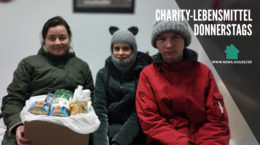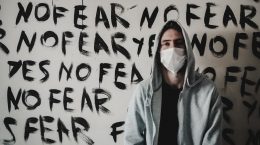Last year, the Grodno Children’s Hospice named after St. Hubert became the center of lawlessness on the part of the security forces. First, a charitable organization helping seriously ill children was evicted from two premises. Then a criminal case was opened against its director Olga Velichko. The hospice began to receive regular visits from the Financial Investigation Department, who were looking for evidence of non-existent crimes. We will tell you how the Grodno Children’s Hospice is doing today.
How did it all start?
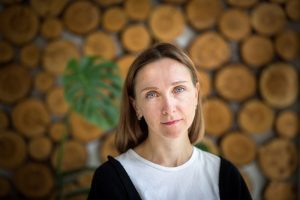
Olga Velichko
The hospice director Olga Velichko is sure that the cause of the problems lies in her civic position. She was an independent observer in the August 9 elections and recorded the facts of fraud. She reported violations to the prosecutor’s office and the CEC. After the suppression of the protests on August 9-12, Olga was one of those who tried to create a Council of People’s Confidence in Grodno. The mayor then backtracked and the authorities came out to talk to the protesters. However, not for long – already in September the hospice started having problems[1].
First, the locks were changed on the premises, which the organisation rented from the Grodno Leninski District School Food Factory. The hospice was later asked to pay damages for the fact that the factory had not used the premises. Then the organization was deprived of an office in a children’s clinic in Grodno (allegedly due to a coronavirus) – and the hospice has been using it for 12 years.
The pressure began on Olga herself: the class teacher of her child threatened to notify the school services and the administration about doubts about the family well-being of the Velichko family. On September 9, the director of the hospice was detained at a charity meeting, where she collected money for the needs of the organization. In October, a trial was held, at which she received a fine of 15 basic units, and almost immediately after that, an audit of the FID began with a search, seizure of documents and letters to sponsors.
On November 16, ICCI “Nash Dom” launched the “SOS Children’s Hospice” campaign to protect the Grodno Children’s Hospice. By this time, the hospice had taken over the premises of the Palliative Care Centre and Olga Velichko (who had gone abroad) had been prosecuted for embezzlement – without providing any details of what had been stolen or to what extent.
On 7 December, a machine for mechanical pulmonary ventilation was taken away from the hospice. The DFR explained: the director collected money for it in 2017-2018, withdrew it from the account, converted it into currency and handed it over to the parents of a child who needed the device for living at home. This is evidenced by a deed of acceptance and transfer of funds. However, according to the law enforcers, the parents did not see either the money or the machine.
In fact, the machine was bought, but was not given to the sick girl. For family reasons, the parents were unable to collect their daughter from the hospital and she was hooked up to the machine in the institution. The machine was then made available for the use of another child who needed to be ventilated.
What has been happening at the hospice since December?
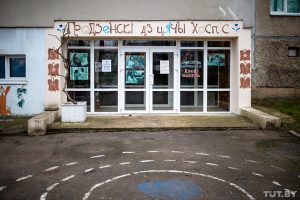 In December, a trial was held, and the hospice was terminated from the lease of the premises belonging to the Oktyabrsky District School Catering Factory. The premises were given to the organisation during the first wave of the coronavirus. Here volunteers sewed PPE, which was given to Grodno doctors free of charge. As a result, now the hospice occupies only one premises – the Palliative Care Center on Ignat Domeyko Street in Grodno, which is provided free of charge by the Orthodox[2] parish. Moreover, at the end of the lease term, the hospice staff could not pick up things from the premises of the plant, even the time of arrival could not be agreed[3].
In December, a trial was held, and the hospice was terminated from the lease of the premises belonging to the Oktyabrsky District School Catering Factory. The premises were given to the organisation during the first wave of the coronavirus. Here volunteers sewed PPE, which was given to Grodno doctors free of charge. As a result, now the hospice occupies only one premises – the Palliative Care Center on Ignat Domeyko Street in Grodno, which is provided free of charge by the Orthodox[2] parish. Moreover, at the end of the lease term, the hospice staff could not pick up things from the premises of the plant, even the time of arrival could not be agreed[3].
Due to the deprivation of premises, the hospice was forced to terminate the rehabilitation program for patients over 18 years of age. About 25 children were left without regular medical assistance and simulators, as well as without the opportunity to study in workshops and communicate. For many of them, the hospice was the only opportunity to receive rehabilitation on a permanent basis, and not twice a year, as it prescribed by law. Now these young people with disabilities are forced to spend time at home[4].
On January 12, the security forces also raided the premises of the Palliative Care Center, arguing that its owner did not forbid such visits. The purpose of the law enforcers was a search, during which it was planned to find a second ventilator “for verifying the numbers.” The search was carried out illegally, without documents. In an ultimatum, they demanded to open a utility room. One of the employees offered to wait for the journalists – this, apparently, forced the FID employees to leave. At the time of the investigators’ visit, there were patients in the hospice and the rude and even boorish manner in which the law enforcers treated them frightened the children[5].
On more than one occasion, investigators from the DIF came to the hospice staff and to the families under care. One of the women, who takes her 15-year-old son to the hospice, said that she was asked about the financial relationship with the director Olga Velichko.
“I explained that I didn’t pay for anything. Hospice services are free, all employees are humane and friendly towards our children, ”she said.
On 22 January the hospice received a document from the Office of the Investigative Committee of the Grodno Region informing it that the property seized during the search in October could be returned due to the necessary expert investigations. However, Olga Velichko said that she fears that during the examination, something could happen to the ventilator that was seized in October. It was planned to pick up the device from IC after an inspection, the price of which is 1200 euros.
On 4 February, the Grodno Children’s Hospice invited people to become members in order to continue helping sick children.
“To save the hospice, we need to build up members. This requires applications from people, regardless of place of residence and citizenship, ”- said representatives of the hospice in social networks.
It is known that as of February 1, 327 applications were submitted to join the organization[6].
What is the situation now?
Until the end of 2020, the hospice fulfilled the state social order for the provision of palliative care for children. But the allocated funds were barely enough to pay the two workers – it was barely reaching the minimum wage. The hospice now has no state contract, which means that it has also lost state support. At the same time, the organization’s staff includes nine employees who receive salaries through charitable assistance.
Palliative services for sick children and their families are still free of charge. Now under the care of the hospice there are about 60 families with seriously ill children. Doctors visit them at home and teach them at the Palliative Care Center.
On 4 March Hrodna prosecutor’s office received a complaint from the children’s clinic No 2, part of the premises of which were occupied by a hospice. The clinic’s administration was concerned that hospice volunteers were sewing protective suits for doctors on their premises in May.
According to the prosecutor’s office, the hospice “without permission, without drawing up an additional agreement, occupied the common areas of the medical institution – a lobby with a corridor where it organized a sewing production.”
As it turned out, these rooms were needed for the clinic to have a separate entrance to the building and separate airlocks to separate the flow of patients and staff.
The statement of the prosecutor’s office says that “the management of the clinic has repeatedly proposed to the director of the hospice to vacate the unauthorized premises, as well as to terminate the lease agreement ahead of schedule. At the same time, it was not possible to obtain the consent of the second party[7]. “
Benefactors paid for the hospice work until mid-February[8]. Funds for the continuation of the organization’s activities are offered to donate through PayPal. From 25-28 February, a charity classical music festival, “Till the Titles go”, was organised in support of the hospice. During these days, three concerts took place, the money from which will go to the hospice account[9].
From the very beginning of the campaign against the Grodno Children’s Hospice, there has been a petition on the change.org website asking the Prosecutor General’s Office, the KGC and the Grodno Regional Executive Committee to stop political pressure on the organization. Now more than 60 thousand people have left signatures to the petition. In January, the creators of the petition wrote that they had decided to approach international organisations concerned with protecting the rights of children and people with disabilities[10].
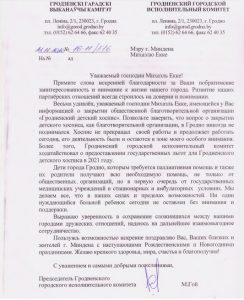 The fate of the Grodno Children’s Hospice is also of concern to foreign countries. The mayor of the German town of Minden, the twin city of Grodno, Michael Ecke, sent a letter to the Grodno City Executive Committee expressing his concern about the events taking place. He received a reply from Grodno – Chairman of the City Executive Committee Mieczyslaw Goy said that the hospice had not stopped its work, its activities remain in the area of special attention of the city administration. Moreover, it turned out that the Grodno City Executive Committee applied for state benefits for the hospice, which in fact does not correspond to reality.
The fate of the Grodno Children’s Hospice is also of concern to foreign countries. The mayor of the German town of Minden, the twin city of Grodno, Michael Ecke, sent a letter to the Grodno City Executive Committee expressing his concern about the events taking place. He received a reply from Grodno – Chairman of the City Executive Committee Mieczyslaw Goy said that the hospice had not stopped its work, its activities remain in the area of special attention of the city administration. Moreover, it turned out that the Grodno City Executive Committee applied for state benefits for the hospice, which in fact does not correspond to reality.
“Children of the city of Grodno, who need palliative care, and also their parents receive all the necessary assistance, not only from public organizations, but primarily from state medical institutions in inpatient and outpatient settings,” the letter says.
Note that in Belarus, apart from Grodno, palliative care is organised only in the capital at the Belarusian Children’s Hospice (a non-profit charitable organisation), which exists thanks to donations. To help terminally ill children in the regions, the hospice has a mobile service in 6 major cities that travels to smaller towns and trains local professionals in rehabilitation techniques. Last year, the service reached 170 families. It is planned that this year centers will appear in three more cities[11].
[1]https://www.dw.com/ru/za-chto-v-belarusi-vlasti-presledujut-grodnenskij-detskij-hospis/a-55724949
[2]https://news.tut.by/society/714491.html
[3]http://www.015.by/news/obshchestvo/khospis-11/
[4]https://imenamag.by/posts/grodno-without-hospice
[5]https://www.facebook.com/vialichka.volha/posts/3509233849130584
[6]https://www.facebook.com/valentina.karoliny/posts/4103078016383509
[7]https://people.onliner.by/2021/03/04/prokuratura-podala-v-sud-na-grodnenskij-detskij-xospis
[8]https://www.facebook.com/lavoncyk/posts/10160849316661679
[9]https://www.facebook.com/Anyafiorellina/posts/3892680750771830
[10]https://www.change.org/p/ stop-political-pressure- on-hrodno-children-hospice/u/28406962




